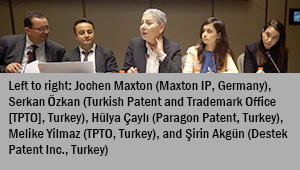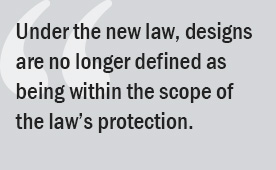Young Practitioners Discuss the ‘Before and After’ of the New Intellectual Property Law in Turkey
Published: May 1, 2019
Ece Gönülal Esin Attorney Partnership (a member firm of Baker & McKenzie International, a Swiss Verein) Istanbul, Turkey
Ekin Tüzün Moroğlu Arseven Attorney Partnership Istanbul, Turkey
 Approximately 40 young intellectual property (IP) practitioners and law students joined INTA in Taksim Square in the heart of Istanbul, Turkey, on April 12 for an afternoon of discussions covering Turkey’s new IP Law No. 6769 (IP Law). The law entered into force on January 10, 2017, following its publication in the Official Gazette.
Approximately 40 young intellectual property (IP) practitioners and law students joined INTA in Taksim Square in the heart of Istanbul, Turkey, on April 12 for an afternoon of discussions covering Turkey’s new IP Law No. 6769 (IP Law). The law entered into force on January 10, 2017, following its publication in the Official Gazette.
INTA opened the event with an overview of the Association’s initiatives and the activities of the INTA Young Practitioners Committee. Following INTA’s remarks, panelists Hülya Çaylı (Paragon Patent, Turkey), Serkan Özkan (Turkish Patent and Trademark Office (TPTO), Turkey), Melike Yilmaz (TPTO, Turkey) and Åžirin Akgün (Destek Patent Inc., Turkey), discussed the changes introduced in the new IP Law in Turkey.
Ramifications of Turkey’s New IP Law
Focusing on patents and utility models, Ms. Çaylı highlighted the removal of the deferred examination system in the new law, as well as changes affecting the ownership of academic staff inventions, plant varieties and biological material, opposition terms, and restoration of rights. She noted that the registration procedures for employee inventions were currently quite complex and suggested the adoption of a simplified method.
 Mr. Özkan began by discussing the name change of the TPTO-whose previous formal name was the Turkish Patent Institute. Regarding the Regulation of Implementation of Intellectual Property Law, he went on to explain the granting procedures, use obligations, compulsory licenses, state-funded inventions, and other changes.
Mr. Özkan began by discussing the name change of the TPTO-whose previous formal name was the Turkish Patent Institute. Regarding the Regulation of Implementation of Intellectual Property Law, he went on to explain the granting procedures, use obligations, compulsory licenses, state-funded inventions, and other changes.
Next, Ms. Yilmaz outlined new developments in the trademark arena under the new law, including the allowance of similar trademarks to coexist by means of a consent letter; changes to the provision regarding the loss of rights due to remaining silent; the broadened scope of actions regarded as trademark infringement; the non-use grace period of trademarks; and the proof-of-use request as a defense tool in oppositions, cancellation, and infringement actions.
Under the new law, designs are no longer defined as being within the scope of the law’s protection, Mr. Akgün explained. He also focused on the newly introduced novelty examination and the protection of unregistered designs, as well as changes regarding combined products, employee designs, and design-application requirements.
IP Career Development
The day’s activities concluded with an interactive roundtable session on career opportunities in the area of IP, moderated by Jochen Maxton (Maxton IP, Germany). Young practitioners in attendance asked questions about international career opportunities and requirements for becoming a trademark and patent attorney in various jurisdictions.
Discussions also touched on career opportunities at the TPTO; how the TPTO supports the professional development of their specialists; and whether it is more beneficial for trademark and patent specialists to have a legal education or a technical education such as engineering. The panel also discussed such emerging issues as the impact on artificial intelligence on the future of legal professions.
After an informative afternoon, participants attended a reception where they had the chance to network with fellow young professionals. Several participants praised the presentations for being both engaging and informative.
The Young Practitioners event was co-hosted by Turkish firms Destek Patent Inc., Anadolu Patent Inc., and Demir & Partners Law Firm.
Although every effort has been made to verify the accuracy of items in the INTA Bulletin, readers are urged to check independently on matters of specific concern or interest.
© 2019 International Trademark Association
This website uses cookies so that we can provide you with the best user experience possible. Cookie information is stored in your browser and performs functions such as recognising you when you return to our website and helping our team to understand which sections of the website you find most interesting and useful.
To find out more please see our Cookies Policy and Privacy Policy.
These cookies are used to identify a user’s browser as the visitor goes from page to page on the Site. These are session cookies, which means that the cookie is deleted when you leave the Site. It is an integral piece of the Site software and used to let the server know which users are on the Site at any given time and make certain parts of the Site easier to use.
|
|
If you disable this cookie, we will not be able to save your preferences. This means that every time you visit this website you will need to enable or disable cookies again.
These cookies are used to collect information about how visitors use our Site. The cookies collect information in anonymous form, including the numbers of visitors to the Site, where visitors have come to the Site from, the pages they visited and how they have interacted with tools on the Site like search and embedded media players. We use the information to compile statistical reports of our users’ browsing patterns so that we can improve the Site.
|
|
Please enable Functionality Cookies first so that we can save your preferences!
These cookies are used to deliver advertising relevant to the interests of visitors to our Site. They are persistent, which means they will remain on your device after you leave the Site.
- Facebook (Ad Pixel)
- Google (Ad Pixel)
- LinkedIn (Ad Pixel)
- Quattro Anonymous
Please enable Functionality Cookies first so that we can save your preferences!
